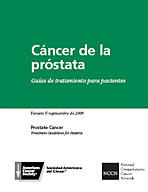June 1, 2007 2007— PORTLAND, Ore. Â Oregon Health & Science University Cancer Institute researchers have identified a protein that is a strong indicator of survival for men with advanced prostate cancer. The C-reactive protein, also known as CRP, is a special type of protein produced by the liver that is elevated in the presence of inflammation.
 "This could mean that a simple blood test that is already available could help patients and doctors make better decisions as they become more informed about what to expect from the prostate cancer they are facing," said Tomasz Beer, M.D., director of the Prostate Cancer Research program at the OHSU Cancer Institute, associate professor of medicine, (hematology/medical oncology) OHSU School of Medicine.
"This could mean that a simple blood test that is already available could help patients and doctors make better decisions as they become more informed about what to expect from the prostate cancer they are facing," said Tomasz Beer, M.D., director of the Prostate Cancer Research program at the OHSU Cancer Institute, associate professor of medicine, (hematology/medical oncology) OHSU School of Medicine.
Beer's research will be presented Friday, June 1 at the 43rd annual meeting of the American Society of Clinical Oncologists in Chicago. Julie Graff, M.D., OHSU Cancer Institute member, division of hematology and medical oncology, will present the research.
It has been known that cancer causes an inflammatory response. This research also suggests that inflammation may play an important role in driving prostate cancer progression and resistance to therapy.
"While sometimes inflammation may slow the cancer, an increasing body of evidence suggests that cancer can take advantage of the inflammatory response and the inflammatory cytokines released by the immune reaction may in fact fuel cancer progression. To the extent that our hypothesis proves true, C-reactive protein may be reflecting the overall intensity of the inflammation," Beer said.
The finding that higher CRP is associated with shorter survival and a lower probability of response to chemotherapy is a result of a secondary analysis of inflammatory markers in subjects enrolled in the ASCENT study, a large Phase 2 clinical trial that evaluated treatment with docetaxel and DN-101, a high dose formulation of calcitriol or docetaxel with placebo. This analysis included subjects from both groups. The analyses were supported by Novacea Inc., the sponsor of the ASCENT study. This new finding was in collaboration with Novacea.
The results of ASCENT were published February 20, 2007 in the Journal of Clinical Oncology. . The most significant finding from the trial of advanced prostate cancer subjects was the magnitude of DN-101 (Asentar) used in combination with docetaxel (Taxotere), on survival, producing an estimated 49 percent improvement in survival (p=0.035), while reducing the frequency of serious adverse events by 34 percent (p=0.023) as compared to the use of Taxotere alone.
Because this was the first time CRP has been linked with both response and survival in advanced prostate cancer patients receiving chemotherapy, it will be important to confirm this finding in an independent data set before this can become a routine blood test for men with advanced prostate cancer, Beer said.
OHSU and Beer have significant financial interest in Novacea Inc., a company that has a commercial interest in the results of this research and technology. This potential conflict was reviewed, and a management plan approved by the OHSU Conflict of Interest in Research Committee and the Integrity Program Oversight Council was implemented.
The OHSU Cancer Institute is the only cancer center designated by the National Cancer Institute between Sacramento and Seattle. It comprises some 120 clinical researchers, basic scientists and population scientists who work together to translate scientific discoveries into longer and better lives for Oregon's cancer patients. In the lab, basic scientists examine cancer cells and normal cells to uncover molecular abnormalities that cause the disease. This basic science informs more than 200 clinical trials conducted at the OHSU Cancer Institute.
To access all OHSU news releases please visit www.ohsu.edu/news/




